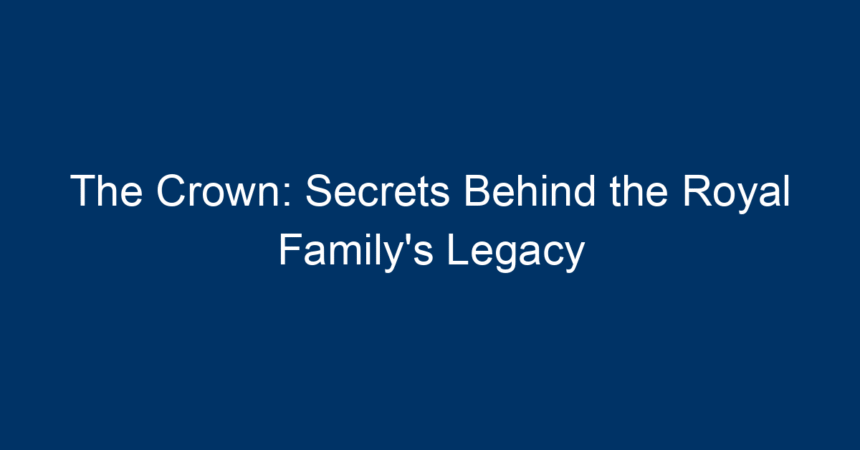Introduction
In the world of television, few shows have stirred as much intrigue and controversy as The Crown. This riveting series, which chronicles the life of Queen Elizabeth II and the tumultuous events surrounding the British monarchy, has captivated millions around the globe. But beyond the stunning cinematography and compelling storytelling lies a treasure trove of secrets that outline the royal family’s legacy. In this article, we delve into the layers of history, scandal, and tradition that shape the British monarchy, uncovering why The Crown is more than just a dramatization—it’s a window into the complex world of royalty.
The Historical Context of The Crown
Understanding the Monarchy’s Role
The British monarchy is one of the oldest institutions in the world, steeped in centuries of tradition and cultural significance. The Crown explores not only the personal lives of royal figures but also their influence on national and global events. By setting the stage with historical context, viewers gain insight into the weight of expectations placed upon the royal family.
Key Historical Events Featured in The Crown
Some of the most significant moments in British history are portrayed in The Crown, including:
- World War II: The series starts with the backdrop of the war, illustrating the resilience of the monarchy during challenging times.
- The Suez Crisis: The political landscape shifts as the royal family navigates their role in international conflicts.
- The 1980s and Beyond: Key events such as the rise of nationalism and changing public sentiments are pivotal in shaping the monarchy’s image.
Behind the Scenes: The Making of The Crown
Casting Choices: A Royal Reflection
One of the secrets behind The Crown‘s success is its meticulous casting. Each actor embodies not just the character but also the emotional depth of historical figures. Claire Foy, Olivia Colman, and Imelda Staunton each bring unique interpretations to Queen Elizabeth II across the decades.
Attention to Detail: Authenticity in Storytelling
The production team behind The Crown invests immense effort in ensuring historical accuracy. From wardrobe selections to set designs, the authenticity witnessed on screen draws viewers deeper into the struggles faced by the royal family.
Exploring the Impact of The Crown on Public Perception of the Monarchy
Shifting Narratives
The Crown has shifted public perception, triggering a reevaluation of the royal family’s legacy. While the series has been celebrated for its portrayal of emotional struggles and personal relationships, it also raises questions about the monarchy’s relevance in contemporary society.
The Controversy Over Artistic License
Many royal watchers express concern about how much of The Crown is factual versus dramatized. Critics argue that while the emotional truths resonate, some portrayals may cross the line into fiction. The delicate balance between reality and dramatization invites lively discussions about the responsibilities of storytellers.
Key Themes in The Crown
Duty vs. Personal Desire
A central theme resonates throughout The Crown: the tension between duty and personal desires. Characters such as Prince Charles grapple with the expectations of royalty against their longing for individual happiness. These conflicts highlight the sacrifices made in the name of duty, guiding the audience to empathize with these iconic figures.
Gender Roles and Feminism
The Crown subtly addresses the evolution of gender roles within the monarchy. As Queen Elizabeth II’s reign progresses, the changing social landscape reveals both challenges and triumphs for women in power. The significance of feminism appears not only in the personal journeys of female characters but in the overarching narrative of modern monarchy.
The Strain of Public Scrutiny
The continuous public scrutiny the royal family faces is another poignant theme. The Crown illustrates how the media’s relentless attention impacts relationships and personal lives. This theme prompts discussions on privacy, mental health, and the ramifications of living under a microscope.
The Royal Family’s Legacy: Lessons for Today
Understanding Leadership
The royal family’s legacy extends beyond the pages of history; it offers valuable lessons in leadership. Effective leaders must navigate complex relationships, face public criticism, and make sacrifices for the greater good—skills exemplified by Queen Elizabeth II herself.
Resilience in Adversity
Throughout The Crown, resilience emerges as a cornerstone of the royal family’s legacy. The ability to stand firm in times of adversity, whether facing national crises or personal turmoil, is a reminder of the strength within every individual.
Evolution of Tradition
While tradition holds immense value, The Crown shows that the ability to adapt is equally important. The monarchy’s evolution amidst changing societal norms emphasizes the need for organizations—both royal and otherwise—to embrace change while honoring history.
Conclusion: The Crown and the Future of the Monarchy
The Crown is more than just a dramatization of the royal family’s life; it’s a profound exploration of identity, duty, and legacy that resonates with audiences worldwide. As viewers become invested in the characters’ journeys, they also engage in larger conversations about leadership, public scrutiny, and the evolution of tradition.
As we reflect on the secrets and stories gleaned from The Crown, it’s clear that the legacy of the royal family is far from static; it is a living, breathing narrative that continues to shape our understanding of power and resilience.
Actionable Insights
- Engage with History: Explore documentaries and books that delve into British history to enrich your understanding.
- Reflect on Leadership: Consider the qualities that make a good leader, drawing inspiration from the resilience exhibited by the royal family.
- Embrace Change: Like the monarchy, adapt and evolve in your personal and professional life, honoring traditions while embracing new perspectives.
By engaging with the themes presented in The Crown, we can glean valuable lessons that transcend royal walls and find relevance in our own lives.




